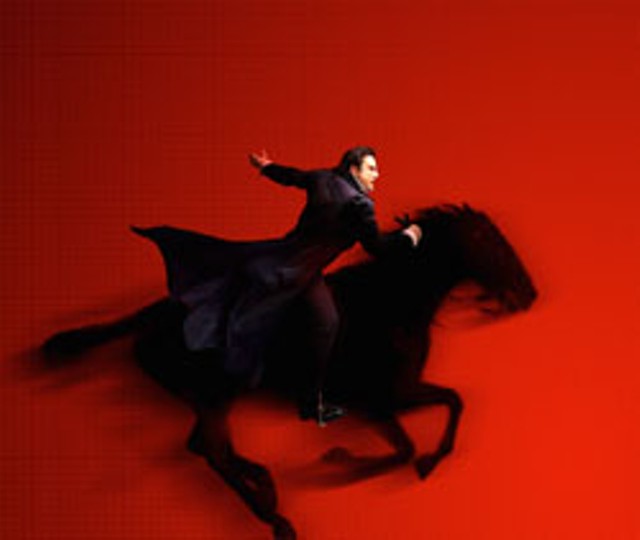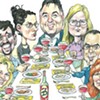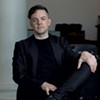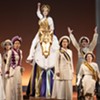Published September 17, 2008 at 5:33 a.m.
A new performing-arts season is upon us, and culture junkies around the region are already feeling the rush of anticipation. But given a shaky economy, record-high fuel prices and the challenges of international travel, no one could be blamed for asking the question: How long will the world’s performing artists continue to frequent small venues in the northeastern U.S.? Conversely, presenting organizations might worry whether the audiences will come out, too.
On both scores: So far, so good. For starters, season brochures from regional venues indicate no shortage of acts from around this country and farther-flung places — virtuoso pianist Alexander Ghindin from Russia, Kahurangi Maori dancers from New Zealand, singer Cesaria Evora from Cape Verde, the National Acrobats of China, and so on. “We always try to have a good diversity of international acts and domestic,” says Hopkins Center programming director Margaret Lawrence. She concedes that artist fees are going up — in fact, they have been since well before the current gas “crisis” — but “it has never been in line with the ticket price we’ve felt comfortable asking,” Lawrence notes. “Our job is to do everything we can do keep those costs down.”
According to Arnie Malina and Natalie Neuert — of the Flynn and Lane Series, respectively — tickets for many shows are selling briskly. Look at it this way: A ticket for, say, the Soweto Gospel Choir is a lot cheaper than airfare to South Africa. Call it a vacation in a venue.
The Metropolitan Opera has found an economical way to head north — live! from New York! — reaching fans through the magic of HD, or high-definition, broadcasts. The Hop launched a series last year, and its popularity inspired Lawrence to more than double the number of broadcasts this year. Each of 10 productions — including a Met premiere of John Adams’ Doctor Atomic — will be shown twice in the arthouse-sized Loew Auditorium. Dress-up clothes are optional, but viewers definitely don’t need opera glasses. HD technology employs 10 robotic cameras to capture bird’s-eye views from all around the stage. And while the N.Y. cast is in intermission, distant viewers can watch behind-the-scenes features about the making of the opera.
Vermont opera fans will applaud the latest news: Middlebury’s Town Hall Theater, finally reopened after extensive renovations, is getting The Met: Live in HD this year, too — albeit just five of the productions. That’s a regal addition to a season schedule already brimming with acts from near and far.
Like edgier entertainment? Nearly every performing arts season includes multimedia productions incorporating music, dance, theater and/or exciting visuals. Think the Bronx-based hip-hop theater ensemble Universes. Their “Live From the Edge” show mixes poetry with social issues and diverse musical styles that, says the Village Voice, “demands to be seen.” (The show has been moved from the FlynnSpace to the McCarthy Arts Center, and switched from December 12 and 13 to December 5 and 6.)
At the Hop, the U.K.’s DV8 Physical Theatre is a triple threat with fearsome dance, theatricality and political consciousness in its piece, To Be Straight With You — a North American premiere. In it, the performers speak — in vignettes taken from interviews with real people — while accomplishing “amazing physical movement,” explains Lawrence. “It’s dazzling to watch.” The Hop show is one of just three DV8 appearances in the U.S. this year.
Those who like a more intimate theater experience will find storytellers, puppetry and solo performers on the bills. But the most up-close-and-personal experience of the season has got to be Rotozaza’s “Etiquette.” Never mind blurring the line between audience and performer; this cutting-edge U.K. performance group eliminates it altogether. The “show” takes place in the Dartmouth Bookstore, and the actors are, well, you and some other person. You sit down at a table, put on headpho
It’s a good message; whether you’re onstage or in the last row of the balcony, performance is about humans inspiring and amazing other humans. And who couldn’t use more of that?
PAMELA POLSTON
******
Kahurangi: Maori Dance — Theatre Of New Zealand
Hopkins Center, October 7, 7 p.m. $26/5.
New Zealand’s native Maori share Polynesian ancestry with people as far away as Easter Island and Hawaii. These cultures all have fascinating stories about how and why their forebears migrated from one set of Pacific isles to another. It’s fitting that Waka, which translates as “canoe,” is the name of the Maori Dance Theatre of New Zealand’s show — and its Hopkins Center debut. In “music, song, dance and mime,” Waka brings to life the lengthy and perilous waterborne journey, undertaken a thousand years ago, that brought Maori ancestors from Samoa.
Kahurangi, which means “a cloak from Heaven,” is the touring company of Hastings, New Zealand’s Takitimu Performing Arts School, where students can get a Bachelor of Maori Performing Arts. The school, which awards the country’s oldest university-level dance degree, is an integral part of the renaissance of Maori culture. The troupe’s enthusiastic embrace of its educational mission is one of the reasons Hop director Margaret Lawrence was eager to bring Kahurangi to Dartmouth. The artists will give workshops for students during a half-week residency and lead a post-performance discussion after Waka.
The warrior origins of Maori haka (dances) make for energetic, edge-of-your-seat entertainment. In ancient times, haka often formed part of ritualized preparation for battle. (New Zealand’s national rugby team does its version of a haka before international matches.) Dancers exaggerate facial expressions to make themselves look menacing, flashing the whites of their eyes and sticking out their tongues. Movements are vigorous, accompanied by spirited chanting.
Part of the Hop’s mission, Lawrence notes, “is to spotlight cultures that are not seen in the Upper Valley.” Kahurangi’s family-friendly show is an exciting, authentic introduction to the Maori, she believes. “It’s a proud culture, it’s a celebratory culture, it’s a culture that holds very firm to being able to tell its own story.”
ELISABETH CREAN
******
Lane Series at UVM Recital Hall, October 4, 7:30 p.m. $25.
In dumbed-down America, what’s an overweight, loud-mouthed, self-professed layabout smart dude to do? Mike Daisey became a monologuist, a person who sits all alone on a stage, sans props, and tells stories. It’s nice work if you can . . . get someone to pay for it.
The whimsically named Daisey has been doing just that since barreling onto the performance scene at the New York International Fringe Festival in 2001. And unlike his best-known solo-talking-guy predecessor Spalding Gray, he does it without a script. Daisey manages to keep track of several narrative threads in his extemporaneous shows. He’s an affable, life-of-the-party type who holds listeners in thrall with funny stories, wry observations and sometimes offensive commentary.
One YouTube video captures audiences walking out of a Daisey show following a bit about “fucking Paris Hilton.” While the whole thing could have been part of the act, Daisey’s bafflement seems genuine, and his ability to roll with this particular punch — continuing to engage the remaining audience — demonstrates an uncanny ability to improvise.
For his Lane appearance, Daisey will present an excerpt from his “Great Men of Genius” series, focusing on the underrated scientific visionary Nikola Tesla. Lane Series Manager Natalie Neuert says she heard the monologuist on a National Public Radio show about Tesla and was fascinated. “A week later the agent for Mike Daisey called and said, ‘What do you think about putting him on the program?’ I said, ‘Yes, if he can do the Tesla show.’”
Isn’t the performer a bit edgy for the Lane, arguably best known for its topnotch classical and world-music programming? “Our audience shifts depending on what we do,” Neuert says. “We just decided to start blurring the boundaries of what is ‘a Lane show,’” she adds. “We just want to do good shows that work in a 300-seat venue. A monologuist fit really well.”
No doubt Burlington will welcome the chance to find out what’s driving Mr. Daisey.
PAMELA POLSTON
******
Lebanon Opera House, September 30, 7:30 p.m. $25/$35/$45.
A New York Times critic once suggested Cesaria Evora was the master of “happy-sad music.” Her first international hit, a song called “Sodade” (1988), refers to a term that’s key to her native Cape Verde culture; it has to do with homesickness, longing, sadness and regret. Fans of the melancholy fado might disagree, but there’s no denying that Evora reigns at home, and is beloved in the world-music scene.
Make no mistake, though: While Evora might pull heartstrings with minor-key Creole “ocean blues” numbers, those Afro-Portuguese rhythms are sneakily sinuous, and every track on her 10 CDs is hypnotically melodic. Regardless of mood, Evora makes singing sound effortless, and lovely. Her talent has been acknowledged with four Grammy nods, including a win for Best World Music Album in 2003, for Voz d’Amor.
It’s a coup for the Lebanon Opera House to book “the Barefoot Diva,” so called because of her penchant for performing shoeless. Evora may or may not find the temperature accommodating at the end of September in New England. But fans will no doubt provide a warm welcome for the 67-year-old crooner, who is said to perform some 150 concerts a year.
It wasn’t always so. Evora was born into a poor family; her father died when she was 7, and her mother struggled to support her. Ultimately, little Cesaria was sent to an orphanage. But there she learned to sing, in the orphanage choir, and at the age of 16, the story goes, a sailor taught her the traditional morna and coladera musical styles. Though she became a popular local singer in Cape Verde, financial success continued to elude her, and she eventually fell into what Evora now calls her “dark years,” which included wrestling with alcoholism. She didn’t perform for a decade.
Finally, a Cape Verdean exile in France persuaded Evora to go to Paris and record an album — the one that included “Sodade.” Four years later, Miss Perfumado catapulted her to international stardom. She was 47.
Twenty years later, Evora shows no signs of slowing down. Chances are, she’ll cast an island spell even in New Hampshire.
PAMELA POLSTON
******
Moore Theater, Hopkins Center, October 3 & 4, 8 p.m. $30/5.
Fall is but a jeté away, and along with it comes the chance to see the choreography from one of the premier artists in modern ballet: Dartmouth’s Hopkins Center presents choreographer Karole Armitage’s company, called Armitage Gone! Dance.
During her long career, Armitage danced under Balanchine with the Ballet du Grand Theatre de Geneve, was invited by Baryshnikov to work with the American Theater Ballet and then, oh, picked up a little gig with Rudolph Nureyev. That resume’s not too shabby. More importantly, it suggests this will be a not-to-be-missed performance.
Armitage was once dubbed the “punk ballerina,” but recent reviews from New York Times critic Claudia La Rocco suggest her style has changed. “It’s 2008 — these are no longer ‘punk ballerinas,’ but they’re certainly street.” That street style Armitage interprets so well will be showcased at the Hop in two innovative pieces. The Ligeti Essays, set to the music of Romanian composer Gyorgy Ligeti (best known for compositions featured in Stanley Kubrick’s A Space Odyssey and Eyes Wide Shut), features sweeping movement juxtaposed with piercing, complex revolutions set on a bleak, wintry landscape. Armitage has been quoted as saying the piece “feels like an ice storm.” Vermonters can relate.
Time Is the Echo of an Axe, on the other hand, celebrates her understanding of contemporary classicism. Accompanied by Bela Bartok’s Music for Strings, Percussion and Celesta, this critically acclaimed dance highlights the choreographer’s emphasis on strong bodies and multiple types of movement not limited to ballet — think yoga with a touch of martial arts. That, and the raw emotion of the piece (clips can be viewed on YouTube), promise an evening of pure beauty. Outkast gave us the term “ear-gasm,” but Armitage may very well give rise to an audience-wide eye-gasm.
KINSEY LABBERTON
******
The Spaghetti Western Orchestra
Flynn MainStage, October 27, 7:30 p.m. $29/35.
Spaulding Auditorium, Hopkins Center, October 28, 7 p.m. $26.
Late Italian filmmaker Sergio Leone’s “Spaghetti Westerns” set a new standard for the entire Western film genre with the landmark A Fistful of Dollars in 1964. Though groundbreaking both in cinematography and style — and for introducing an actor by the name of Clint Eastwood — the stark quality of his works would not have been possible without the chilling scores penned by fellow Italian Ennio Morricone. The composer is responsible for more than 500 works in television and film. But none is more instantly recognizable than his iconic collaborations with Leone. To wit, the opening whistle from Fistful’s title tune is now practically synonymous with Westerns as a genre.
Pulling from the entire “Man With No Name” trilogy, Once Upon a Time in the West and a host of others, Australia’s Spaghetti Western Orchestra performs Morricone’s music with astounding accuracy and reverence. But this is no mere tribute act. With a surreptitious blend of visual and auditory high jinks, an appropriate touch of camp and spot-on sound effects — re-created live using a variety of musical tools and toys — the quintet’s innovative, double-barreled theatrics have enthralled audiences around the globe and given birth to a new genre of performance all their own: spaghetti musical theater.
DAN BOLLES
******
Red Heroine: Film Screening with Live Original Soundtrack, Lane Series at the Film House at Main Street Landing Performing Arts Center, November 8, 8 p.m., $15/13.
The films of Ang Lee and Stephen Chow have brought Wu Shu to the modern mainstream. Vermont made its own contribution to the genre this spring in the form of The Forbidden Kingdom, written by Morrisville resident John Fusco. What even devotees may not know is that martial arts on the silver screen started in the silent-film era, well before Bruce Lee and Jackie Chan kicked their way into the American consciousness.
Though few examples have survived, a single episode of Wen Yimin’s serial, Red Heroine, is still watchable after its debut nearly 80 years ago. The Shanghai-made silent follows Yun Mei in her quest for revenge against the army that raided her village and killed her beloved grandmother. With the tutelage of a wandering Taoist, the White Monkey, Yun Mei becomes the warrior necessary to bring down the Birth of a Nation-looking assemblage of horse-riding rascals.
Sponsored by Burlington music and T-shirt entrepreneurs Tick Tick, the Devil Music Ensemble perform original experimental music to accompany the sometimes mystical themes of the film. Known for its national tours playing new soundtracks for other silents, such as Nosferatu and the Cabinet of Dr. Caligari, the group always uses eccentric instrumentation. This time, the band adds erhu (a Chinese bowed instrument) and Chinese lap steel and percussion to their usual mix, which includes electric violin, vibraphone and a trio of synthesizers. After outlasting its peers, Red Heroine is sure to be revitalized with this unique aural background.
ALICE LEVITT
******
Abigail Washburn & The Sparrow Quartet
Flynn MainStage, October 4, 8 p.m. $34/40.
Sparrows have long been a powerful literary symbol. Thought to stem from a New Testament reference in which Jesus remarks that even the smallest creature is not forgotten by God, the diminutive songbird has come to represent the juxtaposition of frailty and beauty.
Likewise, Abigail Washburn’s Sparrow Quartet evoke the divine by mining the contrast and convergence of infirmity and grace. In collaboration with banjo virtuoso Béla Fleck, bluegrass fiddle whiz Casey Driessen and innovative cellist-songwriter Ben Solleé, the bilingual songwriter’s fusion of Americana and Sichuan influences is nothing short of stunning.
Drawing from a wealth of original material, along with American and Chinese traditional music, the group forges new musical territory with each performance. As a critic for the alt-weekly Nashville Scene puts it, the quartet is “a one-of-a-kind prism, capturing the glint of global perspectives and refracting it back in a hundred new and different ways.” Or, in the words of Hamlet, “There is a special providence in the fall of a sparrow.” The Sparrow Quartet prove there’s also a special providence in its song.
DAN BOLLES
******
Looking Over The President’s Shoulder
Vermont Stage Company, FlynnSpace, March 11-22, Wed.-Sun. at 7:30 p.m.;
Sat. & Sun. at 2:30 p.m. $24.75 - $32.50.
During his 21 years of service to the Hoover, Roosevelt, Truman and Eisenhower administrations, Chief White House Butler Alonzo Fields had a crucial supporting role. A musical prodigy who was once enrolled at Boston’s New England Conservatory of Music, the African-American Fields lacked the money to pursue his dream of becoming a classical singer. First recruited by Mrs. Hoover, he instead became a fixture at White House functions and a confidant of presidents.
Many of Fields’ 200 pages of diary entries were included in his 1961 book My 21 Years in the White House. Forty years later, James Still adapted the book into a play, Looking Over the President’s Shoulder, that is on Vermont Stage Company’s 2008-2009 season.
Still’s play has been criticized for not adequately addressing Fields’ anger and resentment — or the anger and resentment a sophisticated black man is presumed to have felt. While Fields may have chafed at the upstairs-downstairs nature of his position, his diaries do not suggest as much. He offers mostly generous assessments of his presidential charges — though not without some fascinating asides about their idiosyncrasies. Still wisely lets the audience draw their own conclusions about his experiences. Whether taken as an adapted tour of backroom White House history or a race-relations manifesto, Looking Over the President’s Shoulder will be particularly poignant as we watch a new, still-to-be determined administration find its way in the presidential mansion.
MATT SCANLON
******
Paramount Theatre, Rutland, November 18, 10 a.m. and 12:45 p.m., $6 exclusively for school groups.
Flynn MainStage, Burlington, March 8, 2 p.m. $17.50 adults, $13.50 children, March 9, 9:30 a.m. and 12 p.m., $8.50 exclusively for school groups.
Theater isn’t just for grownups. Vermont’s sandbox set will have the opportunity to partake in a little live performance of its own when TheatreworksUSA presents Max and Ruby, a musical based on the popular Nick Jr. and Noggin television series of the same name and inspired by Rosemarie Wells’ picture books.
The play tells the story of bunny siblings Max and Ruby. When 7-year-old Ruby decides to put on a show for her grandmother, complete with music and costumes, she asks her little brother, Max, for some help. But mischievous Max has his own plans, as 3-year-olds — bunnies or not — often do. Max can’t focus, and his imagination runs wild — from a glow-in-the-dark eel to a fuzzy blue tarantula to a giant wind-up lobster — while the determined Ruby soldiers on with the aid of her Bunny Scout friends. All this action is set to songs ranging in genre from jazz to country and written by Carol Hall, composer of The Best Little Whorehouse in Texas.
TheatreworksUSA, a New York City-based nonprofit and the nation’s largest touring children’s theater company, aims to give fledgling audiences their first taste of performing arts. In addition to lighter fare like Max and Ruby, which is intended for kids 3 and up, Theatreworks also tours shows for older audiences, such as Freedom Train, a play about Harriet Tubman that will come to the Paramount in April. The company provides a career launching pad for young actors, writers, directors and designers. Past Theatreworks performers have gone on to Broadway shows including Hairspray, The Producers and Rent.
In January, a New York Times critic wrote that while Max and Ruby “retains the essential sweetness of Ms. Wells’ creations, it adds welcome spice.” Variety called it “a breezy charmer.” Sounds like adults might not need a carrot to be convinced to tag along with the kids.
ALISON NOVAK
*******
David Neumann/ Advanced Beginner Group
“feedforward” and selected short works, FlynnSpace, January 16 & 17, 8 p.m. $25.
When Serena and Venus Williams face off in the U.S. Open, most of the people watching want to see which swinging sister wins. But New Yorker David Neumann, 43, notes the staccato rhythm of the running and the lines of their lunges. He hears accompaniment in the banter between the game’s on-air announcers. For Neumann, tennis is a dance.
There’s all kinds of back-and-forth in Neumann’s 2007 piece, “feedforward,” in which the choreographer employs audio and visual devices to examine the eccentricities of athletics. The pattern of taped foul lines on stage refers to no known game, but there are artful references to baseball, basketball, football and — how could he resist? — tennis embedded in the clever choreography.
A New York Times review described “feedforward” as “an elegant, spatially adept meditation from someone who knows well the power and the absurdities of sport, as well as the primal nature of its connection to an unmistakably American sense of the world.”
If that makes you feel like running — fast — in the opposition direction, don’t. “It’s wildly funny,” the Times critic assures. Neumann’s vision includes a squirrel mascot with a hard-on. The 11 dancers featured in the piece share the stage with four trombones.
Neumann has a well-earned reputation for smart dance making. But he’s quite the mover also — he’s worked with Baryshnikov on a number of projects. Although he’s not part of the lineup for “feedforward” at the FlynnSpace, Artistic Director Arnie Malina promises Newmann will perform a solo in the show. It’s likely, too, that the piece won’t play out exactly like the version performed last year at New York City’s Dance Theater Workshop, which wound up with a pitcher on the mound voicing his anxieties.
That’s another thing “feedforward” — and the performing arts in general — share with the world of sport. Happily, every match-up turns out a little different.
PAULA ROUTLY
******
Rollins Chapel, Dartmouth College, November 10, 7 p.m. $26.
Anglo-Saxon literature is pretty dry stuff — literally. The only manuscript of the epic poem Beowulf, dated circa 1000 A.D., has many crumbling, illegible edges as a result of an 18th-century fire. But back in the days of mead halls, illiterate kings and their warriors wouldn’t have sought out the page for the gory revenge story. They would have gathered around a fire to hear a scop, or “shaper,” recite the exciting tale from memory, to music.
Benjamin Bagby is such a bard for the 21st century, reviving the poem’s oral tradition with the mesmerizing panache of a modern-day Homer. The early-music scholar speaks and sings the entire poem in the original Old English, accompanying himself on a six-string harp styled after a 7th-century instrument uncovered at an archaeological dig. An American-born academic who’s now an expert in medieval music at the Sorbonne, Bagby has been performing Beowulf at major festivals and venues worldwide since 1990 and honing his chosen craft — The London Times lauded him as “a crack storyteller.”
The anonymously penned poem was written in England, but supposedly chronicles historical events in Scandinavia. Supernatural beasties are a bonus: The man-eating monster Grendel, his fearsome lake-dwelling mother, and an unnamed, fire-breathing dragon form three challenges for the work’s eponymous hero. Bagby is skilled at holding an audience’s attention through it all: Sinister whispers, bone-chilling growls and loud, guttural utterances ring from the rafters.
Oceangoing ships cross seas to gentle wave-laps from Bagby’s fingers, and the same tunings turn violent when swords and shields clash into action. Despite the fact that Old English only shares minor similarities with its modern equivalent, language is reportedly no barrier: A critic from The New York Times noted, “Mr. Bagby came as close to holding hundreds of people in a spell as ever a man has.” (Modern English supertitles help listeners decipher the details.)
Beowulf is coming soon to a theater near you — not 2007’s digitally rendered romp starring Angelina Jolie, but the real deal, or as nearly real as scholarship and showmanship can furnish. Unlike the brute Grendel, you don’t have to give your right arm for the privilege of meeting him.
MEGHAN DEWALD
******
Heiner Goebbels/Hilliard Ensemble
I went to the house but did not enter: A Staged Concert in Three Tableaux
Hopkins Center, April 2, 7 p.m., and April 3, 8 p.m. $30.
Mixed-media production is a catch-all phrase in the performing arts. German composer and director Heiner Goebbels pushes its stage-show definition by blending grand theatrics, vocal ensemble compositions and text from classic literature. Literature? Oh, yes.
Goebbels’ current production, I went to the house but did not enter, is a Hop co-commission that incorporates fiction from three renowned authors — T.S. Eliot, Maurice Blanchot and Samuel Beckett — as well as music from England’s Hilliard Ensemble, the preeminent vocal group. Three tenors and one baritone lend deep sound to some of Goebbels’ haunting compositions within staged scenes from various lives — conventional suburbia and dark hotel rooms — representing each author’s work in an entirely different way.
A critic from the U.K.’s The Guardian called Goebbels’ newest work “slender,” but noted its “immensely powerful atmosphere.” Hop programming director Margaret Lawrence gushes that the piece, which recently debuted in Edinburgh, is “magical and brilliant.” Goebbels, she says, “is this maverick genius composer/theater director, and his visual collaborators are mind-blowing.” It’s very unusual to see his work in this country anywhere but Lincoln Center in New York City, she adds.
I went to the house but did not enter might be thought of as theatrical abstraction, or a theatricalized concert, set to music that calls to mind a Gothic cathedral. Whatever one calls it, audiences will no doubt be glad to enter Goebbels’ house of supremely provocative, dreamlike theater.
JON TAYLOR
******
University of Vermont Recital Hall, November 19, 7:30 p.m. $25.
Mahan Esfahani’s Lane Series concert this fall marks two debuts. The twentysomething keyboard sensation will play in Burlington for the first time, and he will christen a newly built harpsichord, imported from Italy, in its first public performance. Series director Jane Ambrose credits her ex-husband Phil, “who is a harpsichordist himself and a very fine player.” He saw Esfahani at a festival in Tuscany last summer, and enthusiastically recommended the Iranian-born American.
Accordingly, Ambrose listened to recordings of Esfahani’s live performances. (With a CD created in a sound studio, “there’s too much doctoring possible,” she explains.) His “beautiful playing” impressed her immensely. A major Lane Series goal “is that we bring people to Burlington at the very beginning of their careers,” she says. “People that we’re convinced are going to be really fantastic. And I am absolutely convinced that this guy is going to be at the top of his profession very soon.”
Ambrose delighted in the correspondence she struck up with Esfahani. “He is an intellectual omnivore,” she says. The 2005 Stanford grad, now studying at Boston’s Longy School of Music, has an academic resume studded with esoteric musicological, literary and historical interests. Some of this will no doubt be revealed when he speaks with Ambrose’s UVM students, and with concertgoers in a pre-performance talk.
One of the topics for discussion: the new harpsichord, built by Bruce Kennedy in Italy for Phil Ambrose, that Esfahani will put through its first public paces. “The instruments are very prominently known at European festivals, but not in American concert sites,” Jane notes. “So this will be part of the excitement of that concert . . . You’ll get to hear the work of this maker.” Esfahani will also play the Recital Hall’s Charles Fisk organ, “a spectacularly good instrument,” she notes, custom-built for the space. Sounds like a “key” concert not to be missed.
ELISABETH CREAN
******
The Metropolitan Opera: Live In HD
Hopkins Center, Salome, October 11 & 12; Doctor Atomic, November 8 & 9; La Damnation de Faust, November 22 & 23; Thaïs, December 20 & 21; La Rondine, January 10 & 11; Orfeo ed Eurydice, January 24 & 25; Lucia di Lammermoor, February 7 & 14; Madama Butterfly, March 7 & 8; La Sonnambula, March 21 & 22, 1 p.m.; La Cenerentola, May 9 & 10, 12:30 p.m. $25; season pass (10 shows), $219.
Middlebury Town Hall Theater, La Rondine, January 10; Lucia di Lammermoor, February 7; Madama Butterfly, March 7; La Sonnambula, March 21, 1 p.m.; La Cenerentola, May 9, 12:30 p.m. $22.
Would you believe that one of the hottest movie tickets in the Upper Valley last year — at three times the price of a regular flick —was for a matinee, via satellite, of New York’s Metropolitan Opera at the Hop? Eight high-definition live broadcasts, in the 200-seat Loew Auditorium, sold out quickly. “It was beyond our expectations,” recalls Hop director Margaret Lawrence. And the gamble of more than doubling this year’s slate — to two showings each of 10 operas — seems to be paying off. “It’s already selling like crazy, and it may even sell out again,” she shares.
Seeing opera in HD is certainly less expensive than driving to New York City, Boston or Montréal for a comparable caliber of performance. “In some ways, it’s even better than seeing a live opera,” Lawrence suggests, “because there are so many cameras.” This gives you multiple vantage points, instead of the fixed spot of a concert hall seat. One memorable angle she recalls: the camera mounted over the bed for an aria in last year’s Romeo and Juliet.
Intermissions are packed with special features. “You’re suddenly backstage with Renee Fleming, and she’s running around talking to the conductor, and letting you into secret doors, and showing you how they built this costume,” Lawrence explains. “You can get up and leave for intermission if you want, but hardly anybody does, because that’s when the fun begins.”
And the audience enjoys itself heartily. “They act like the singers can hear them, and they clap after arias,” Lawrence says. “It’s a riot.”
Vermonters in the Champlain Valley now have a gas-saving option to get in on the act: Five of the operas can be seen in Middlebury. The newly renovated Town Hall Theater meets the Met’s stringent requirements, with a Bose sound system and 20-foot screen in the 232-seat hall. Bravo!
ELISABETH CREAN
More By This Author
Comments
Comments are closed.
From 2014-2020, Seven Days allowed readers to comment on all stories posted on our website. While we've appreciated the suggestions and insights, right now Seven Days is prioritizing our core mission — producing high-quality, responsible local journalism — over moderating online debates between readers.
To criticize, correct or praise our reporting, please send us a letter to the editor or send us a tip. We’ll check it out and report the results.
Online comments may return when we have better tech tools for managing them. Thanks for reading.















































